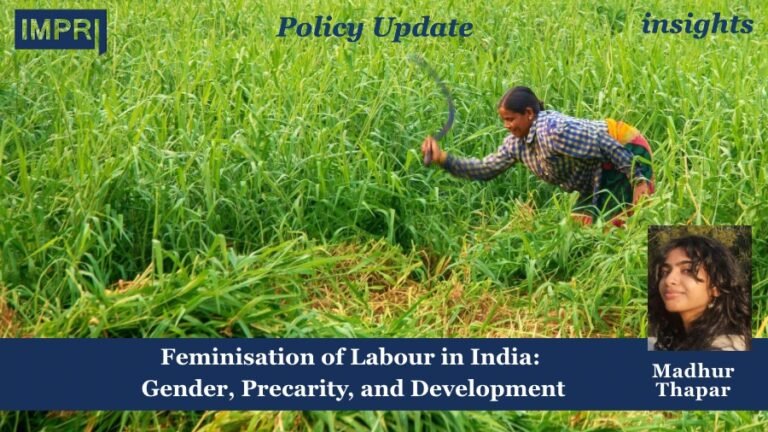Policy Update
Arushi Jain
Background
India has more than 7,500 km of environmentally diverse coastline, which provides a living for millions of Indians and sustains vital industries including coastal agriculture, tourism, marine trade, and fisheries. However, pollution, uncontrolled construction, sea level rise, and climate change are all posing a growing threat to India’s coastline. These challenges demand a strong need for active and evidence-based policy responses.
In response to these types of needs, the Ministry of Earth Sciences (MoES) established the National Centre for Coastal Research (NCCR) in 2018, which replaced the earlier Integrated Coastal and Marine Area Management (ICMAM) Project Directorate. NCCR provides a higher level of ambition and a larger remit; it is meant to provide long-term scientific knowledge into changes happening on India’s coastline. It also helps provide planners, policymakers, and disaster managers with real-time data and resources.
Scientific Mandate and Operational Framework
The NCCR has created a mandate that mirrors the multidimensional nature of the coastal systems of India. It includes:
- evaluating shorelines
- conducting assessments on marine pollution
- improving ecosystem
- building knowledge systems
NCCR fulfills its mandate through real-time monitoring buoys, remote sensing- based shoreline studies, and detailed field and laboratory studies in estuarine and marine contexts.
The center provides technical advice to relevant ministries, state governments, authorities responsible for managing coastal zone development, and pollution control boards. NCCR has grown to build these capabilities ranging from infrastructure, systematically defining coastal regulation zones, and/or identifying sources of marine pollution. The center’s connections span nationally with research partners like Indian National Centre for Ocean Information Services (INCOIS), National Institute of Ocean Technology (NIOT), Indian Meteorological Department, as well as internationally with agencies such as CeFAS (UK) and JAMSTEC (Japan), thus anchoring and advancing India’s contribution to international coastal science.
Research Contributions and Institutional Milestones
NCCR made rapid progress as a significant scientific agency, with major achievements like the National Shoreline Change Assessment Atlas. With scientifically accurate assessments and nearly 30 years of monitoring data, the assessment atlas indicated that nearly 34% of India’s coastline is undergoing erosion. It made key coastal states such as Kerala and Odisha rethink how they protect vulnerable coastal infrastructure in their states.
NCCR also conducts the Seawater Quality Monitoring (SWQM) program, which consists of a monthly manual sampling of over 50 sites in addition to a regular regional buoy-based monitoring network along the Indian coastline. This well-documented and aligned data often enables the forecast of water quality and allows State Pollution Control Boards to locate pollution hotspots, as well as enforce marine discharge issues.
The National Centre for Coastal Research (NCCR) also innovated important research on microplastics, heavy metals and persistent pollutants in estuarine and nearshore coastal environments. The research has become pertinent to national conversations about marine pollution, and is often referenced in future regulations.
In 2024, a new regional center was launched in Visakhapatnam to enhance research and real-time capabilities along the Bay of Bengal. This center focuses on region-specific issues such as post-cyclone sediment shifts, industrial pollution and delta erosion. It also laid the foundation stone for various facilities including a collaborative training facility for the NCCR and India Meteorological Department (IMD).
Policy Impact of The NCCR
Since it was established in 2018, the National Centre for Coastal Research’s (NCCR) influence spans not only to scientific research but also by influencing coastal governance in India.
- The release of the Shoreline Change Assessment Atlas in 2022, which demonstrated erosion along 34% of the Indian coastline, resulted in a number of states reconsidering their coastal planning. Kerala was able to revise its buffer zones based on it and Odisha incorporated it into the infrastructure design for their 2023 coastal projects.
- NCCR’s scientific expertise has provided technical assistance for updating Coastal Zone Management Plans (CZMP) in 14+ coastal states and helped align several state-level decisions. This was also exemplified through the Coastal regulation zone notification issued in 2019 and simultaneously NCCR guiding state policies.
- In controlling pollution, the results obtained from the Seawater Quality Monitoring Programme (started in 2019), invoked states including Goa, Tamil Nadu, and Maharashtra to identify marine discharge hotspots from 2021-2024.
- NCCR’s microplastics study in the year 2022 reported that 70% of accumulated estuarine samples were contaminated. This pressing outcome led to the birth of India’s National Marine Litter Action Plan and other international ocean science platforms.
- In both leadership and participatory modes, NCCR has provided technical inputs into 25+ major coastal projects in the last four years and has trained over 1000 planners and officials through workshops and continued capacity-building programs. NCCR as a research initiative has truly been able to inculcate science into coastal policy at the grassroots level.
- On an international level, NCCR is engaged globally with JAMSTEC (Japan Agency for Marine-Earth Science and Technology) and CeFAS (Centre for Environment, Fisheries and Aquaculture Science, UK) in shoreline modeling and marine pollutants tracking. It has also made datasets available to global ocean platforms and was part of India’s efforts under the UN Decade of Ocean Science from 2021–2030.
- In the domain of neighborhood cooperation, NCCR has participated in Bay of Bengal studies with Bangladesh (2022–2023). NCCR also presentes its integrated science-policy models at South Asian coastal governance forums as potential replicable models.
Systemic Hurdles and Institutional Gaps
While NCCR has progressed well, there are still several gaps that continue to limit its scope of impact. Firstly, monitoring coverage continues to be patchy, especially in more remote and/or ecologically sensitive areas like the Andaman & Nicobar Islands. Real-time data in these areas is still not accurate. Secondly, there is a gap in technical absorption capabilities at the state and district levels. Many local agencies lack the trained personnel or infrastructure to interpret or use the innovations of NCCR. Finally, there are coordination bottlenecks where sometimes information from the NCCR is not fully integrated within multiple departments like environment, ports, disaster management, etc.
Conclusion
NCCR should establish regional centers in data-poor coastal areas and collaborate with educational centers on research and outreach. It would improve data access while also providing technical assistance on the ground. The center should also work towards the local capacity building to assist planners and engineers in making day-to-day decisions using NCCR’s suggestions. On the technical front, developing indicators and forecast tools for definite shoreline change, pollution, and storm conditions with good usability would perhaps increase the utilization of NCCR work.
The NCCR has indeed maintained a large impact on coastal science and coastal policy in India since its inception. The initiatives, from documenting shoreline change to providing advice to manage marine pollution, have lent value and specificity to decisions at different policy levels. Due to its collective body of research and network, the organisation is a prominent center for sustainable coastline solutions in India. The NCCR will continue to provide an enabling role and inform planning and resilience to help promote the vision it has for India.
References
- Ministry of Earth Sciences. (2024, December 18). Parliament question: Stretches of coastline for restoration. Press Information Bureau. Retrieved from https://pib.gov.in/PressReleasePage.aspx?PRID=2085680
- Ministry of Environment, Forest and Climate Change. (2023, December 4). Coastal Erosion. Press Information Bureau. Retrieved from https://pib.gov.in/PressReleasePage.aspx?PRID=1982315
- National Centre for Coastal Research. (2022, March 25). National Assessment of Shoreline Changes along Indian Coast. Ministry of Earth Sciences. Retrieved from
https://nccr.gov.in/sites/default/files/schangenew.pdf - National Centre for Coastal Research. (n.d.). Monitoring – seawater quality data in coastal and estuarine regions. Retrieved from https://nccr.gov.in/?q=activities%2Fmonitoring
- International Collective in Support of Fishworkers. (2024). India: Understanding coastal changes. ICSF. Retrieved from https://icsf.net/newss/india-understanding-coastal-changes/
- Times of India. (2022, July 26). NCCR to deploy water quality buoy, Times of India. Retrieved from https://timesofindia.indiatimes.com/city/visakhapatnam/nccr-to-deploy-water-quality-buoy/articleshow/93124536.cms
About The Contributor: Arushi Jain is a Research Intern at the Impact and Policy Research Institute (IMPRI) and is in the final year of her Master’s degree in International Studies from Symbiosis School of International Studies, Pune.
Acknowledgement: The author sincerely thanks Ms. Aasthaba Jadeja and the IMPRI team for their valuable support.
Disclaimer: All views expressed in the article belong solely to the author and not necessarily to the organisation.
Read more at IMPRI:
Central Public Health and Environmental Engineering Organisation (CPHEEO), 1966
One-Stop Centre (2015): Bringing Dignity, Safety, and Support Under One Roof



